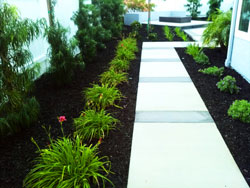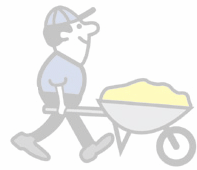Tips to get the most out of your mulch
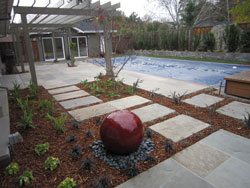
Everyone knows mulch looks good, but it does so much more than look great.
Here are the top 3 reasons you need to mulch your garden this season.1. Save water
Mulch is the ultimate protector for the moisture in your soil. When bare garden beds bake in the sun, any moisture in the soil is rapidly sucked out. Under a layer of mulch, your soil remains dark and cool, retaining moisture for the roots of your plants and preventing the roots from overheating.
2. Protect your soil
As water evaporates, soil dries and compacts, repelling the earthworms and other soil-loving organisms whose movements aerate the soil. When they disappear, plants struggle to expand their root structure. Soil that remains cool and moist under a protective layer of mulch is more appealing to these tiny animals. The result is healthy soil that encourages root growth.
Erosion is another enemy of exposed and dried-out soil. Mulch forms a stable surface that stops wind from whisking off your precious topsoil into the garden next door. And when rain eventually comes, mulch will prevent rainstorms from washing your soil into your drains.
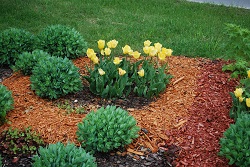
3. Control weeds and pests
One of mulch's most prized properties is weed control. If you are hauling water to your garden, the last thing you want is for it to be swallowed up by thirsty weeds. A thick coating of mulch prevents sunlight from reaching weed seeds, stopping them from sprouting. Many garden pests also dislike mulch. Some organic mulches have scents that repel pests and a rough textured mulch provides an inhospitable surface for crawling insects like slugs and snails.
Tips to make the most out of watering your mulch
- Weed and water the soil before you lay down your mulch. This means that your mulch will immediately be protecting moist soil. If you are using organic mulch, water the mulch when in place.
- For maximum impact on weeds and benefit to your soil, spread your mulch to a depth of about 100mm
- When you are watering mulch, water thoroughly. The water will soak through your mulch into the soil. Do a thorough soaking every few days, rather than a light spray every day. It may take longer, but the moisture will last longer in your soil. Less frequent but more generous watering also encourages deeper root growth.
Consider a mulch garden.
The latest trend, and the most effective way to reduce your outdoor water use, is to xeriscape. Essentially this is a low or no water garden and incorporates mulch of all types, from bark to pebbles, to create a visually appealing garden with minimal upkeep and water use. Xeriscapes use only a few plants and can also include rocks, tree limbs, statues, pots and timber.
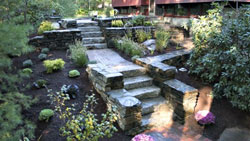
What type of mulch?
Organic versus inorganic mulches.All mulches will protect your soil, but there are additional benefits to specific types.
Organic mulches, which include bark, wood chips and leaves, break down over time and so have a shorter life than inorganic mulches like stones and rocks. However, the environmental benefits of organic mulch to your garden are far greater. As these mulches decompose they add a rich blend of minerals and organic matter to your soil, resulting in a more nutritious growing medium for your plants. Organic mulches are attractive to earthworms and other soil organisms, encouraging the invisible activity that keeps your soil and plants healthy.
Inorganic mulches, which include pebbles, blue metal, quartz and crushed tile, offer a more permanent mulching solution. Laying mulch mat or weed mat under an inorganic mulch offers as close to an impermeable barrier for weeds as it is possible to get, giving you a garden bed that needs virtually no maintenance. If you use pebbles and stones as mulch, you can use different sizes to create effects like dried river beds and other decorative features. Inorganic mulches are also safer to use close to buildings and wooden structures as they will not harbour termites and other pests.
Inorganic mulches don't make the same contribution to the soil that organic mulches do. They also absorb heat during the day and release it at night, which can be drying for your soil. And moving and replacing inorganic mulches is challenging. Be sure you like the look you are getting, because it will be with you and your garden for a long time.
Types of organic mulch
- Compost mulch is produced from green waste and is already partially broken down to immediately start delivering nutrients to your plants. Usually black, with a mixed texture of coarse earth and fine pieces of material, its natural look works in any type of garden.
- Mixed mulch, a mix of leaves and woodchip, breaks down relatively quickly. This casual and low-cost mulch fades from beige to grey and looks natural and effective in relaxed garden environments.
- Pine mulch is a low-cost mulch in natural earth shades, with some pale and white wood
included. Higher grade pine bark has the pale pieces removed for a more consistent colour and has a long life.
Finer-textured grades of pine bark, like 15mm pine bark and 10mm pine bark,can also be certified as soft falls for around play equipment. - Cypress mulch is a beautiful golden colour and is loathed by termites, making it the ideal solution if you need to lay an organic mulch near buildings and other structures. And while termites may hate it, cypress mulch smells amazing to humans. Cypress ages well, with a fine shredded texture that is resistant to being blown away, making it a good mulch for windy areas.
- Eucalyptus, or Eucy mulch, has a reddish brown colour, a fine texture and a beautiful smell. Its colour and smell make it particularly appropriate for native gardens.
- Softwood chips are an excellent budget mulch, or choose hardwood chip for a longer lasting mulch. Both come in natural honey and golden shades in pieces around half the size of a credit card. The pale colours contrast beautifully with grass and leaves.
- Red wood chips vibrant colour is stunning against foliage. Natural dyes are used, so there are no environmental concerns.
- Black wood chips are the latest trend for most contemporary garden designs, and contrast brilliantly with green leaves. Like red wood chips, black wood chips are coloured with environmentally-friendly natural dyes.
Want to know more?
Read our latest articles here:
Decorative Pebbles and Gravels
Delivery
With yards at Brookvale and Taren Point, our landscaping and building products can be delivered throughout greater Sydney including Sutherland Shire, Eastern Suburbs, Western Suburbs, Northern Beaches, and beyond. Loose products such as mulch, soil, sand and pebbles can be tipped or delivered in bulk bags.
Secure your delivery time as you check out.








